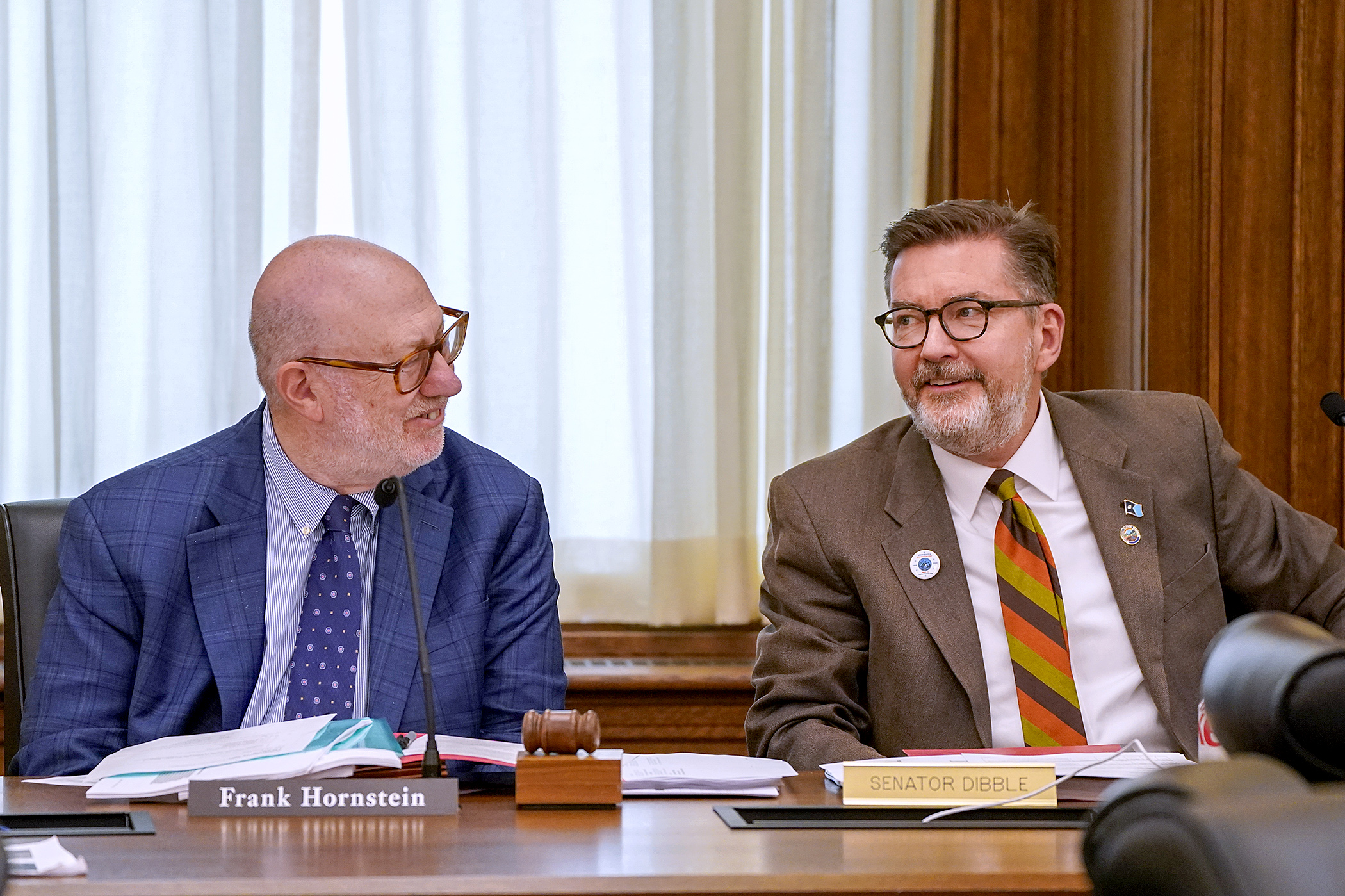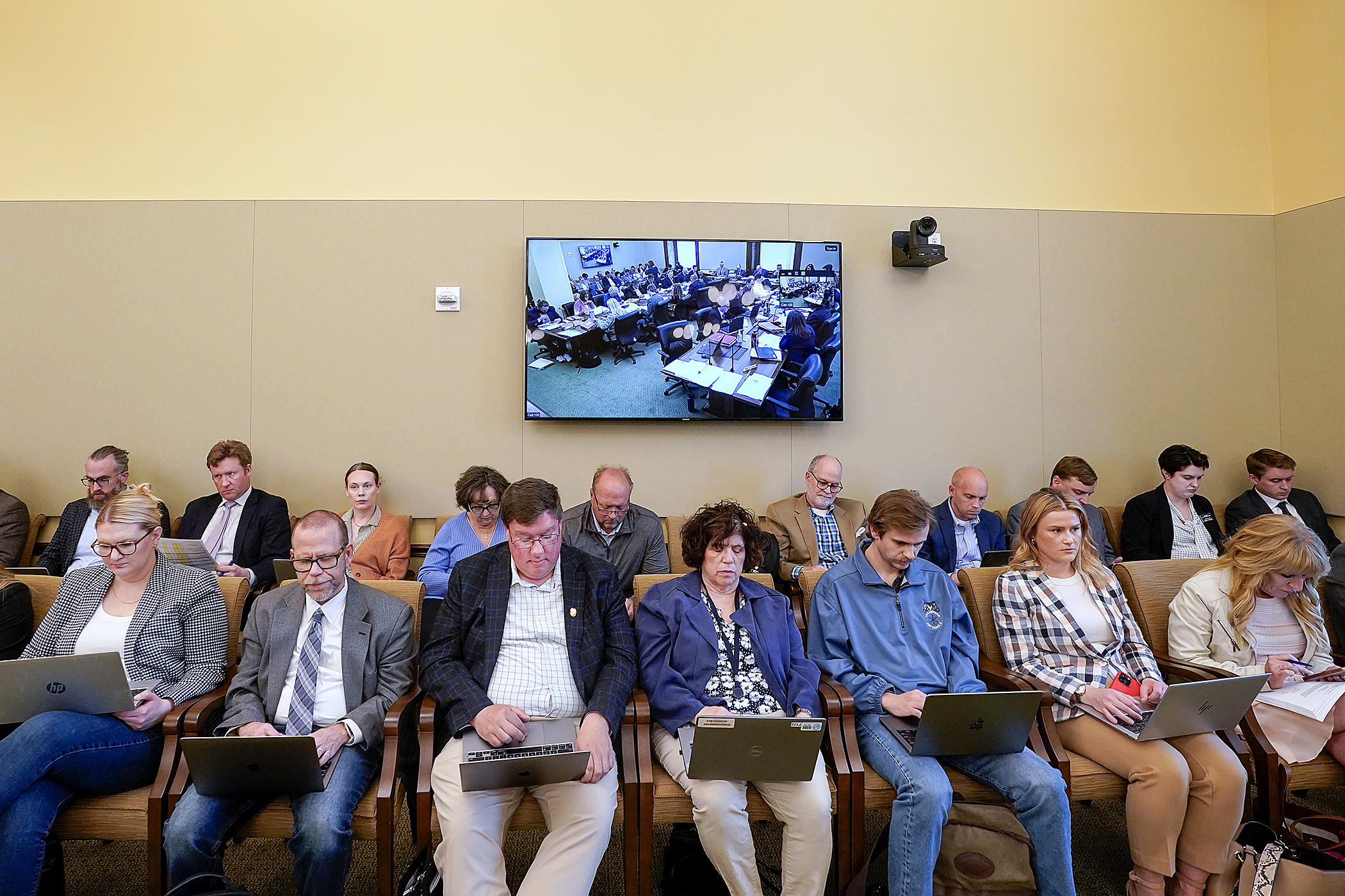Conference committee dives into transportation, labor, housing bill

A few days after each body passed extensive, multi-provision bills, conferees started reconciling differences on the transportation, labor and housing supplemental budget bill Friday.
“These are three very important areas,” said Rep. Frank Hornstein (DFL-Mpls), who sponsors HF5242 with Sen. D. Scott Dibble (DFL-Mpls).
Among areas of difference are a Senate-only provision to allow speed cameras and a House-only provision increasing penalties for misclassifying employees as independent contractors.
Following a walk-through, the conference committee got some momentum building during the meeting by adopting same and similar provisions in the labor section of the bill.
But Rep. John Petersburg (R-Waseca) cautioned against going too far down that road in the first meeting since bipartisan agreement in one body may not exist in the other.
The committee plans to return to work Monday with possible testimony and adoption of other areas of agreement.
Labor and industry
The labor finance section of the bill would increase spending by $10 million in the Senate language and $11.3 million in the House language.
Conferees approved several same-and-similar language provisions relating to combative sports rule changes, mediation services, rules lowering acceptable blood lead levels for workers and definitions.
[MORE: Supplemental labor budget sheet]
Misclassification of employees
House-only language on the misclassification of employees would ensure a business does not classify, represent, treat, report, disclose, document, or enter into an agreement with an employee, or require employees to agree to be misclassified or treated as something other than an employee — like an independent contractor. The Department of Labor and Industry could penalize a business up to $10,000 per violation.
Both bodies would appropriate more money for enforcement, training and outreach.
 Lobbyists, stakeholders and other interested parties attend the May 10 conference committee meeting on HF5242 – the transportation, labor and housing supplemental budget bill. (Photo by Michele Jokinen)
Lobbyists, stakeholders and other interested parties attend the May 10 conference committee meeting on HF5242 – the transportation, labor and housing supplemental budget bill. (Photo by Michele Jokinen)U of M collective bargaining
Senate-only language would amend the Public Employment Labor Relations Act to allow University of Minnesota workers, including students, more flexibility in organizing their own collective bargaining units. The bill would fund the program with $335,000 for fiscal year 2025.
Rise Up Center
The bulk of the labor finance spending in the House bill — $10.7 million — would go to Tending the Soil to help construct the Rise Up Center in Minneapolis. Located in a former YWCA, it would be a workforce development hub serving and training about 3,000 workers annually. Of that, $9 million would be for the renovation and $1.74 million for broadband internet. Similar Senate language would appropriate $9 million for the project but not the funding for internet service.
[MORE: Labor committee advances supplemental finance bill]
Transportation
The transportation portions call for different spending levels by redirecting money in last year’s approved budget. The House would appropriate $94.1 million from all funds, including:
- $40 million for high priority bridges;
- $20 to improve Department of Transportation facilities;
- $9 million for the small cities assistance program; and
- $3 million to hire additional driving exam testers.
The Senate bill calls for $86.4 million in appropriations, including a $20 million increase in state road construction funding, $10 million more for high priority bridges and $5.5 million for the Corridors of Commerce program.
The Senate bill specifies that $10 million from the $40 million appropriated last year to extend light rail northwest from downtown Minneapolis would fund a new “Antidisplacement Community Prosperity Program Board.”
[MORE: Comparison of the transportation articles]
One major policy difference between the Senate and House provisions is the Senate would allow traffic enforcement by camera in a few communities, including Minneapolis. Tickets for speeding or running a red light would go to a vehicle’s registered owner. Penalties would be a warning on the first ticket and $40 for the next, which could double for those clocked at more than 20 mph over the speed limit.
Other Senate only provisions would:
- allow lane splitting (by motorcycles) as long as they are moving no more than 15 mph faster than the speed of traffic;
- allow some online renewal of driver’s licenses;
- allow pedestrian malls in all cities and permit them outside central business districts; and
- require studies to examine commercial driver shortages, Metro Mobility enhancements, a clean transportation fuel standard, special license plates and possible state use of autonomous mowers.
House-only provisions would:
- limit train length to 8,500 feet and increase required insurance when railroad employees are transported by motor;
- ensure people convicted of impaired driving not related to alcohol would have drug testing instead of ignition interlocks to regain driving privileges; and
- allow special Minnesota United Football Club license plates with proceeds going to Minnesota Loon Restoration Project.
Housing
The House and Senate housing proposals are very similar with close to $9 million going for the Family Homeless Prevention and Assistance Program. The biggest difference is $3.3 million in the Senate bill going to senior housing rehabilitation.
[MORE: Comparison of the housing articles]
House-only provisions aim to speed up access rental assistance programs, while Senate-only provisions would limit cities’ ability to put aesthetic mandates on residential buildings, such as minimum square footage or design elements like decks, porches or gables; and extend the Greater Minnesota housing infrastructure grant program to allow counties as well as cities to participate and include manufactured housing developments.
— Session Daily writer Brian Basham contributed to this story
Related Articles
Search Session Daily
Advanced Search OptionsPriority Dailies
Speaker Emerita Melissa Hortman, husband killed in attack
By HPIS Staff House Speaker Emerita Melissa Hortman (DFL-Brooklyn Park) and her husband, Mark, were fatally shot in their home early Saturday morning.
Gov. Tim Walz announced the news dur...
House Speaker Emerita Melissa Hortman (DFL-Brooklyn Park) and her husband, Mark, were fatally shot in their home early Saturday morning.
Gov. Tim Walz announced the news dur...
Lawmakers deliver budget bills to governor's desk in one-day special session
By Mike Cook About that talk of needing all 21 hours left in a legislative day to complete a special session?
House members were more than up to the challenge Monday. Beginning at 10 a.m...
About that talk of needing all 21 hours left in a legislative day to complete a special session?
House members were more than up to the challenge Monday. Beginning at 10 a.m...